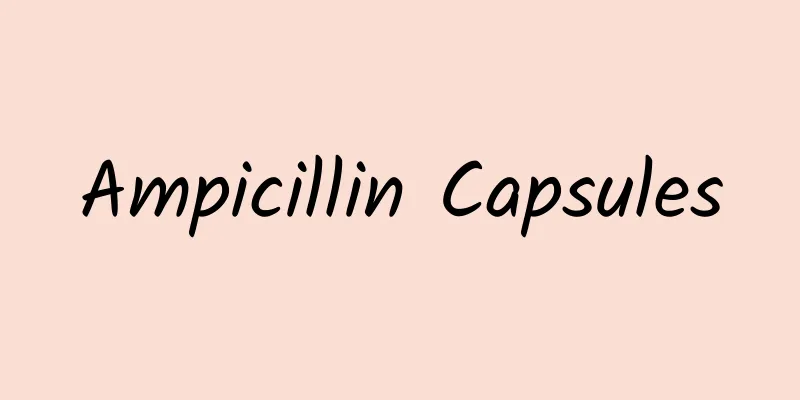Ampicillin Capsules

|
Ampicillin capsules are a very common medicine in life. Such medicines have different ways to treat diseases, so you cannot choose them casually, otherwise it will cause great harm to your health. Especially if you choose it to treat your own diseases, you also need to understand how to use it. Therefore, you need to understand the parts you don’t understand so that there will be no abnormalities during use. So what kind of medicine is Ampicillin Capsule? How does it help in treating diseases? The following is a detailed introduction so that you can use it with confidence when choosing it. Ampicillin capsules : Element: The main ingredient of this product is ampicillin. Indications: Used for respiratory tract infections, urinary tract infections, digestive tract infections, ear, nose and throat infections, skin and soft tissue infections caused by sensitive pathogens. Dosage: oral. Adults: 0.25-0.75g each time, 4 times a day. The daily dose for children is 25 mg/kg based on body weight, 2-4 times a day. Contraindications: 1. It is contraindicated for patients who are allergic to penicillins or cephalosporins or have a positive penicillin skin test. 2. It is contraindicated for patients with uric acid kidney stones or acute gout attacks. 3. It is contraindicated for patients with active gastrointestinal ulcer. Note: 1. Before using this product, it is necessary to inquire about the drug allergy history in detail and perform a penicillin skin test. 2. Use with caution in patients with abnormal blood biochemistry and blood count. 3. Patients with liver and kidney dysfunction should not take this product. 4. Patients with infectious mononucleosis, cytomegalovirus infection, lymphocytic leukemia, and lymphoma are prone to rash when using this product and should avoid using it. 5. Once anaphylactic shock occurs, emergency treatment must be given on the spot, including keeping the airway open, administering oxygen, and administering epinephrine, glucocorticoids and other treatment measures. Adverse reactions: 1. The adverse reactions of this product are similar to those of penicillin, with allergic reactions being the most common. Rash is the most common reaction, which usually occurs 5 days after medication and appears as urticaria or maculopapular rash; interstitial nephritis may also occur; anaphylactic shock is occasionally seen. 2. Gastrointestinal reactions such as glossitis, gastritis, nausea, vomiting, enteritis, diarrhea and mild abdominal pain are also common. 3. Granulocytopenia and thrombocytopenia are occasionally seen in patients taking ampicillin. Antibiotic-associated enteritis is rare, and a small number of patients experience elevated serum alanine aminotransferase (ALT). interaction: 1. Used in combination with probenecid will prolong the half-life of this product. 2. Ampicillin and kanamycin have synergistic antibacterial effects against Escherichia coli and Proteus. 3. Allopurinol can increase the incidence of ampicillin rash reaction, especially in hyperuricemia. 4. Ampicillin can stimulate estrogen metabolism or reduce its enterohepatic circulation, thereby reducing the effectiveness of oral contraceptives. |
<<: The efficacy and function of pine needles
>>: The efficacy, effects and eating methods of lily
Recommend
What are the effects and functions of elderberry
Elderberry, also known as comfrey, is a tradition...
Can cerebrospinal fluid help make “rejuvenation” a reality?
Rejuvenation and immortality have been the unremi...
Will a nuclear power plant leak? Will it suddenly explode like a nuclear weapon? Don't believe these "nuclear" rumors anymore!
When it comes to the word "nuclear", ma...
The efficacy and function of mountain spinning top
Mountain spinning top is a medicinal material tha...
The efficacy and function of Ryoteng
Liangteng is a common Chinese medicine in clinica...
With raw material shortages and high technological barriers, when will the chip shortage crisis be alleviated?
Last November, a piece of news appeared in the Pe...
One out of every two adults has this real "secret"!
Studies have shown that bad breath has become the...
Will artists be replaced in the AI era? 丨AIGC New Career Observation
Can AI become the “Ma Liang’s magic brush” that c...
Some people say that octopuses are alien intelligent life. Is this true?
Some time ago, the incident of a netizen encounte...
What are the benefits of drinking purslane boiled water?
In real life, Purslane is a very common plant, an...
The efficacy and function of bristle
In fact, the occurrence of many human diseases is...
What diseases can be cured by boiling water with horseweed?
Purslane, scientifically known as Portulaca olera...
The efficacy and function of Asteraceae
As for Aristolochia scabra, I think some people m...
The efficacy and function of Tibetan peach leaf coral leaf
Tibetan peach coral leaf has a long history, and ...
Why is gold, a precious metal, so valuable? | Science Gallery
Creator: China Digital Science and Technology Mus...









